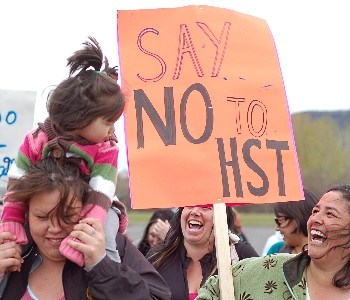Traffic slowed to a crawl on a small stretch of the Thunder Bay Expressway Tuesday as Fort William First Nations community members continued to fight the pending harmonized sales tax.
The rally saw nearly 200 people march onto the Highway between Arthur Street and the Thunder Bay International Airport shortly after 2 p.m. The protest was not a blockade.
Instead demonstrators stood on the outside lanes and allowed Thunder Bay Police Service officers to wave traffic through slowly.
Drivers were handed HST leaflets as they drove through the gauntlet of protesters waving handmade signs.
Beau Boucher-McLaren, 18, was one of several younger participants who said they wanted to stop the tax because it infringed on First Nations treaty rights.
"I would like to see more of our youth get involved," said Boucher-McLaren. "This does effect our future as native Canadians. I would like to see our treaty rights taken into consideration."
The HST will merge the eight per cent provincial sales tax with the federal five per cent goods and services tax. The result will be a 13 per cent harmonized sales tax.
First Nations people are PST exempt from most goods at point-of-sale in Ontario when they present government issued identification. Unless something changes, the point-of-sale exemption will not exist with HST.
Many protesters said they wanted to see the provincial and federal governments put a mechanism in place to give them that point-of-sale exemption. Not doing so, some argue, would be a violation of treaty rights.
Similar protests were staged across Ontario. While most of the rallies focused on the tax’s possible treaty infringement, many protesters like Boucher-McLaren pointed out that HST wouldn’t exclusively be levied against Aboriginals.
"This effects everybody, " he said. "When anyone goes to buy their first house they have to pay one tax, but now with HST they will have to pay more. So it effects everybody, not just us."
For Fort William First Nations chief Peter Collins, Tuesday’s protest was a result of a lack of consultation.
"That’s why we are out here," Collins said. "It’s an eight per cent levy against First Nations people and it has a detrimental impact on all of our communities."
Goods purchased in First Nation communities will still be exempt from the HST, but First Nations members must pay the tax on purchases made outside of those communities. Until a point-of-sale exemption is put in place, Collins said First Nations communities will continue the fight against HST.
Other protests and rallies are scheduled around the region throughout the month.
Sign in or register
- Messages
- Post a Listing
- Your Listings
- Your Profile
- Your Subscriptions
- Your Likes
- Your Business
- Support Local News
- Payment History
Registered Users
Already have an account?
New Users
Create a free account.
